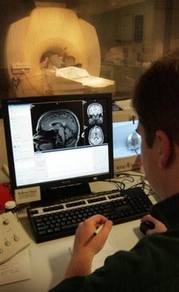More Brain Scans in the News
 Not long after posting about Brain Fingerprinting Labs, I ran across another “lie detector” brain scan report written by an AP reporter and appearing in USA Today. The author of the article, Malcolm Ritter, submitted himself to a test of the technology in a neuroscience lab at the Medical University of South Carolina.
Not long after posting about Brain Fingerprinting Labs, I ran across another “lie detector” brain scan report written by an AP reporter and appearing in USA Today. The author of the article, Malcolm Ritter, submitted himself to a test of the technology in a neuroscience lab at the Medical University of South Carolina.
The experiment was fairly simple – Ritter “stole” a watch from a drawer in the lab, and was questioned about the theft of the watch, as well as about several items that weren’t stolen. The questioning took place while he was in a fMRI (functional magnetic resonance imaging) scanner which recorded the activity in his brain. He denied taking the item in every case. After a few days of analysis, the researchers correctly identified the item which he stole, purely from his brain activity as he responded to questions.
A for-profit firm, Cephos Corp., has been founded by entrpreneur Stephen Laken founded to commercialize the brain-scanning work being done at the Medical University of South Carolina. Meanwhile, similar work being done at the University of Pennsylvania is being commercialized by a new firm, aptly named No Lie MRI Inc.
Both of these firms will use fMRI brain scans for their lie detection process. fMRI machines are large, expensive, and have some limitations due to the powerful magnetic fields the generate, but are currently the tool capable of capturing the most detailed views of brain activity. As described in previous posts, fMRI scans are also used for analyzing response to advertising. The Neuroethics & Law Blog quotes from a Yahoo News version of the same AP story. There are still quite a few questions that need to be answered before fMRI scans become a universal lie detector (see also How to Lie with fMRI), but the entrepreneurial interest in the technology shows that some people think it’s a only matter of time before brain scans are widely accepted as indicators of truth.
